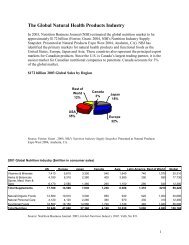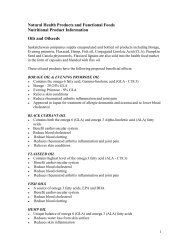Beyond Borders: Global biotechnology report 2010
Beyond Borders: Global biotechnology report 2010
Beyond Borders: Global biotechnology report 2010
You also want an ePaper? Increase the reach of your titles
YUMPU automatically turns print PDFs into web optimized ePapers that Google loves.
“The biggest challenge for Western<br />
companies is to really understand the<br />
local market, including the local culture,<br />
available resources, infrastructure and<br />
Government policies.”<br />
So my advice to companies moving into China is threefold. First,<br />
really do your homework and understand the local market. Second,<br />
tailor your business model to your specific needs and the nature<br />
of the local market. Third, partner with local entities — companies,<br />
governments, and academic and medical institutions — to navigate<br />
the market.<br />
Mazumdar-Shaw: I agree completely that partnering with local<br />
companies has its merits. For example, as national health systems<br />
struggle with containing costs, they will inevitably need to rely<br />
on tender-based procurement from the private sector. But to win<br />
these sizeable contracts, it is important to partner with a regional<br />
company that knows the landscape and can bid much more<br />
aggressively than a big or foreign firm could do on its own.<br />
One other area that is often underestimated is the significant<br />
investment — both in time and money — necessary to establish your<br />
brand in a new market. Partnering with a regional company and<br />
leveraging its distribution network will allow much faster market<br />
entry and bigger gains in market share.<br />
But probably the biggest risk and challenge to any new market,<br />
particularly markets as complex as India and China, is awareness of<br />
the regulatory regime. This may be the biggest benefit in partnering<br />
with a local company that is more adept and up-to-date with the<br />
increasingly changing regulatory landscape in these markets.<br />
Ernst & Young: In the current climate, many Western companies<br />
need new models for raising capital creatively, tapping<br />
alternative sources of revenue and operating more efficiently.<br />
Given that Asian firms have often developed models different<br />
from the typical Western biotech model, what lessons, if any,<br />
could Western firms learn from their Asian counterparts?<br />
28 <strong>Beyond</strong> borders <strong>Global</strong> <strong>biotechnology</strong> <strong>report</strong> <strong>2010</strong><br />
Mazumdar-Shaw: Western biotechs tend to be dependent on a<br />
very high-risk, all-or-nothing business model funded by VC firms<br />
looking for timely returns on investment. This puts a lot of pressure<br />
on companies to find a path to an exit, because VCs have a limited<br />
investment horizon. Of course, if a drug candidate fails, the<br />
company is often finished unless it can find more funding to go on<br />
to something else.<br />
We can’t afford that sort of operating model in India, because risk<br />
capital is largely unavailable for Indian biotech companies. Our<br />
businesses are mostly debt-funded. A bank isn’t looking for a VCstyle<br />
“exit” — it simply wants you to pay back your loan by managing<br />
risk well and building a sustainable, profitable business. Companies<br />
like Biocon are self-funded — we use revenues from our product<br />
and services to fund our R&D pipeline. So Indian companies have to<br />
carefully manage risk in making R&D choices and determining their<br />
business mix. For Western biotechs, the lesson may be in how you<br />
approach your business model — are you building an investment<br />
opportunity or building a sustainable business?<br />
Jiang: The “standard” biotech business model has served Western<br />
patients and economies wonderfully for decades. Now, we need<br />
to serve the needs of patients in emerging markets. And to do<br />
that, we need new thinking and new business models. Of course,<br />
Western companies should preserve good corporate principles and<br />
bring them to emerging markets, including quality, ethics and legal<br />
protections. But the biggest mistake they could make is coming in<br />
with preconceived notions and doing everything “as usual.”<br />
In the area of talent, for instance, one mistake multinationals<br />
can make is to not fully appreciate and utilize the potential of<br />
local talent. There is always an adjustment period during which<br />
“The ‘standard’ biotech business model has<br />
served Western patients and economies<br />
wonderfully for decades. Now, we need to<br />
serve the needs of patients in emerging<br />
markets. And to do that, we need new<br />
thinking and new business models.”








